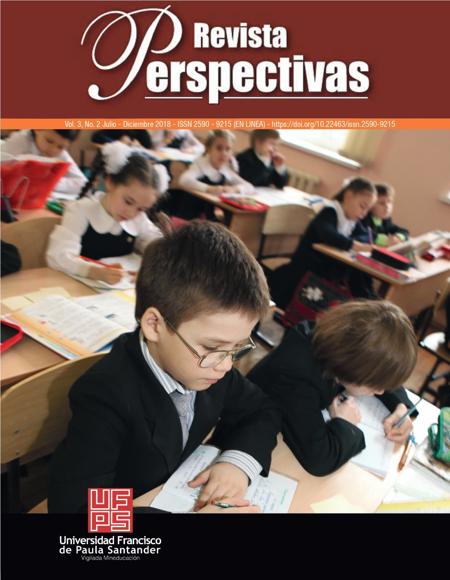Dominio afectivo de los estudiantes de educación media hacia las matemáticas
Dominio afectivo de los estudiantes de educación media hacia las matemáticas
Main Article Content
a compulsory subject for all educational levels, which contributes to the
development of logical thinking and mathematical thinking of students.
For this reason, it is proposed to relate the affective domain that middle
school students have to mathematics with academic performance in
the area. To do this, the beliefs of the students of secondary education
towards mathematics are first determined. Followed by, describe the
emotions that middle school students have towards mathematics. To
finally, identify the attitudes that middle school students present towards
mathematics. The work is carried out in a period of six months, at the
Misael Pastrana Borrero Educational Institution in Cúcuta, Norte de
Santander. The investigation is of correlative type. The population to
develop the project was taken into account the students of the Misael
Pastrana Borrero School belonging to the central headquarters, which
offers the educational service from sixth to eleventh grade in a single
day and is made up of 800 students. In this investigation the sample
will be taken for convenience, since probabilistic sampling is not done
but, it will be applied to all students of tenth and eleventh grade of the
Misael Pastrana Borrero headquarters. Information is collected from a
questionnaire submitted to expert judgment and adapted to the context
for that purpose. The data is processed through Microsoft Office tools
and the SPSS program. The information obtained establishes that the
affective domain that the students have towards mathematics is positive
and their academic performance was good, also it is found that there is
a possible relationship in some aspects of the affective domain with the
academic performance of the students
Downloads
Article Details
Alonso, A. V., & Mas, M. M. (1986). La teoría de la atribución y el rendimiento escolar. Educación y cultura: revista mallorquina de pedagogía, (7), 225-241.
Alonso, S., Sáez, A & Picos, A. (2004). ¿Por qué se rechazan las matemáticas? Análisis evolutivo y multivariante de actitudes relevantes hacia las matemáticas. Revista de educación, 1(334), pp.75-95.
Benito Álvarez, P. (2014). Los factores afectivos en la enseñanza y aprendizaje de lenguas extranjeras.
Caballero, A., Blanco, L. J. y Guerrero, E. (2007), Las actitudes y emociones ante las Matemáticas de los estudiantes para Maestros de la Facultad de Educación de la Universidad de Extremadura.
Chacón, I. M. G., & Hoz, A. D. L. O. (1997). Procesos de aprendizaje en matemáticas con poblaciones de fracaso escolar en contextos de exclusión social. Las influencias afectivas en el conocimiento de las matemáticas. Universidad Complutense de Madrid.
Esquivel, E. C., Araya, R. G., & Sánchez, M. C. (2008). Creencias de los estudiantes en los procesos de aprendizaje de las matemáticas. Cuadernos de investigación y formación en educación Matemática, (4).
Fernándes, I. (2009). Fortalezas y dificultades de los estudiantes de básica según sus desempeños en saber. Recuperado de: https://www. mineducacion.gov.co/1621/article-241773. html
García Sánchez, J., Aguilera Terrats, J. R., & Castillo Rosas, A. (2011). Guía técnica para la construcción de escalas de actitud.
Gil Ignacio, N., Guerrero Barona, E., & Blanco Nieto, L. (2006). El dominio afectivo en el aprendizaje de las Matemáticas.
Gil, N., Blanco, L. J., & Guerrero, E. (2005). El dominio afectivo en el aprendizaje de las matemáticas. Una revisión de sus descriptores básicos. Revista iberoamericana de educación matemática, 2(1), 15-32.
Hernández, R., Fernández, C & Baptista, M. (2010). Metodología de la Investigación, 5ta. Ed., México, DF, México: MacGraw-Hill.
Hernández, R., Fernández, C & Baptista, P. (2003). Metodología de la investigación (Vol. 3). México: McGraw-Hill.
Hidalgo Alonso, S., Maroto Sáez, A., & Palacios Picos, A. (2005). El perfil emocional matemático como predictor de rechazo escolar: relación con las destrezas y los conocimientos desde una perspectiva evolutiva. Educaciónmatemática, 17(2).
Martínez Padrón, O. J. (2005). Dominio afectivo en educación matemática. Paradigma, 26(2), 7-34.
Ministerio de E d u c a c i ó n Nacional. (2011). Decreto 1290 de 2009. Recuperado de http://www.mineducacion.
gov.co/1621/articles- 187765_archivo_pdf_ decreto_1290.pdf
Noguera, S. D., Ramírez, W. D., & Martínez, J. L. D. (2016). Correlación de las actitudes y el rendimiento académico en la asignatura de matemáticas. MATUA, 3(1).
Padrón, O. J. M. (2008). Actitudes hacia la matemática. Sapiens. Revista Universitaria de Investigación, 9(1), 237-256.
Rosal, A. A. S. (2010). Estrategias didácticas para el aprendizaje de los contenidos de trigonometría empleando las TICs. EDUTEC. Revista electrónica de tecnología educativa, (31), 130.







